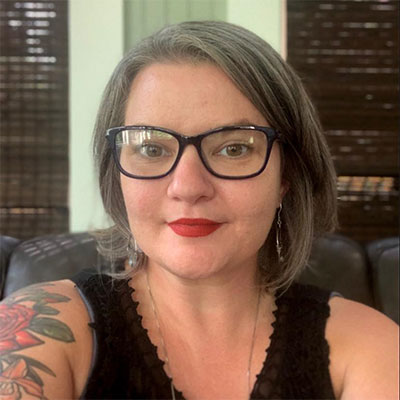Kimberly Skelton, LCHMC-S, LCAS
Over the past year of holding KAP Training events, we have had the honor to connect with many skilled and passionate practitioners. Kim Skelton is one such outstanding PRATI alum. After attending our July 2021 KAP training, Kim carried what she learned into her psychotherapy practice and now offers KAP to a growing clientele in Asheville, North Carolina. In October, Kim stepped into a volunteer faculty role with PRATI. Thanks, Kim!
Tell us a little about your psychotherapy practice and your vision for the world.
As a psychotherapist, my driving force is to support and empower psychospiritual growth, healing, and recovery through compassionate connection and mindful, heart-centered care.
I own and operate Widening Circles, LPC, a private mental health and substance use disorder practice in Asheville, NC focused on providing individualized, intensive treatment in an integrative outpatient setting. Utilizing an innovative, multidisciplinary team approach, we offer comprehensive assessment and intensive treatment tailored to the needs of each client. Many of our providers are dually licensed to treat mental health and substance use disorder conditions and have years of experience working with the interplay of complex trauma, addiction and mental health concerns. I’ve recently partnered with a local Asheville nonprofit, The Pearl Psychedelic Institute, to develop models of care allowing greater access to psychedelic medicine. My hope is that we recognize and embody our own unique gifts to offer the world. We need elders in this time and place. We need resilience, flexibility, tenacity and connection with the Mystery.
What do you appreciate most about using KAP as a modality with your clients?
Integrating KAP into treatment is transforming my practice. I often see clients presenting with a complex constellation of co-occurring concerns who have bounced from treatment to treatment with little to no relief. In my experience, KAP offers a pathway for decreasing long-engrained defenses, allowing clients increased cognitive flexibility and openness to the possibilities of deep healing. I’ve seen clients with seemingly intractable suffering and illness experience relief and hope after years of intermittent suicidality. Ketamine has a long track record of safety. This coupled with a relatively short-acting mechanism of action allows KAP to be readily integrated into a myriad of treatment settings.
What is one piece of advice you would offer for a provider interested in starting to practice KAP?
In this rapidly emerging field of medicine, we have a distinct responsibility to set the tone as psychedelic medicines enter the legal treatment space. In order to offer ethical and safe KAP, take time to seek out quality education, connect with other values-aligned practitioners, and continue to do your own work. We are here to humbly offer clients the opportunity to access their own capacities for healing.




